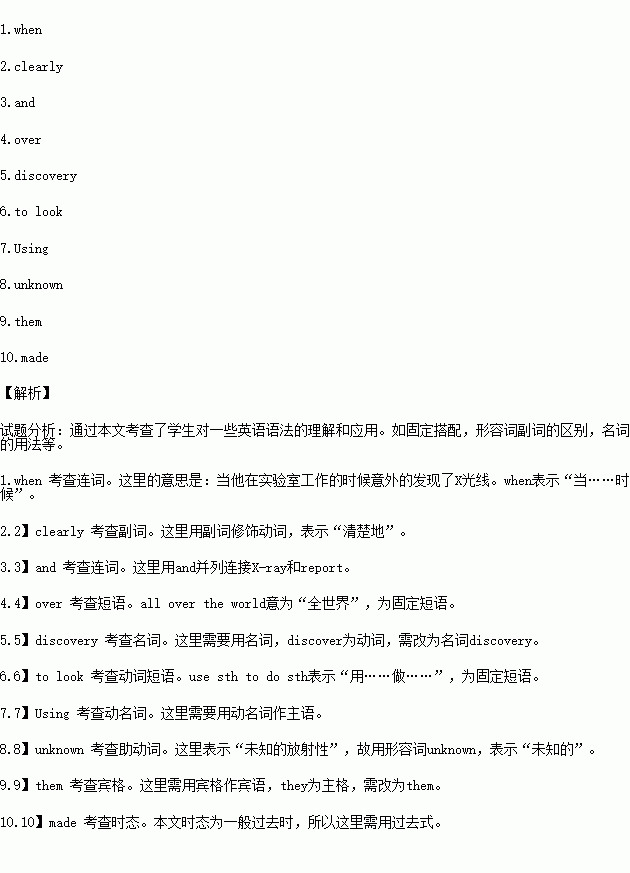题目内容
阅读下面材料,在空白处填人适当的内容(1个单词)或括号内单词的正确形式。将答案填写在答题卡的相应位置。
Wilhelm Roentgen was a German scientist. In 1895 he was working in his laboratory 1. he discovered X-rays by accident. A week later, he took an X-ray photograph of his wife's hand. It 2. (clear) showed her wedding ring and her bones. He sent the X -ray 3. a report about his work to the Medical Society of his city. Soon after, newspapers all 4. the world wrote about his 5. (discover), for which Roentgen won the Nobel Prize in physics in 1901. X-rays are still a big part of all our lives. Doctors and dentists use X-rays 6. (look) inside the body. 7. (use) X-rays, airlines look inside baggage and scientists study the stars. How did Roentgen choose the name "X-ray"? He called these rays "X" rays to show this was a (an) 8. (know) type of radiation. In mathematics, we usually use the letter "x" for quantities we don't know. Many of Roentgen's friends wanted him to call 9. (they) Roentgen rays, but he didn't. The name "X-ray" stayed but Roentgen's X-ray 10. (make) our world changed.
1. Six Hours Free Parking If you spend 100ormoreinourstoresyouwillreceivesixhoursoffreeparking.Whenyouhavespent100 or more, just take this coupon and your receipt to the customer service desk on level 4. They will stamp your parking ticket to allow 6 hours of free parking. Offer here until November 14. |
2. Win a $1000 CD Collection Win your choice of $1000 worth of CDs from JB Music Store. Just buy any two CDs and your name will go into the competition. Select your own prize from our wide variety of rock, pop, jazz and classical music. Competition ends November 14. Prize drawn on November 21. Check store for more information. |
3. Buy One, Get One Free Buy one shirt or tie at Daniel's Menswear, and get another shirt or tie of the same value free. Choose from any of our dress shirts and we will give you another one at no cost. Hurry! Offer ends November 14. Offer limited to one per customer. |
4. 10% Off Present this coupon at The Book Store to get a 10% discount on any books you buy. We have lots of books to choose from, including children's books, novels, travel guides, and science works. You are sure to find something that you will enjoy. Shop now for Christmas, we have a large quantity of toys as gifts for you and avoid the rush! Offer here until November 14. |
5. Half-price Movie Tickets Buy any full-price movie ticket on Tuesdays or Wednesdays, and you can buy a second ticket for a friend for only half price. The latest movies are here, being shown in one of our five theaters at Bayfield Shopping Center. Offer here through December 1, Limit on per customer. |
6. Free Soft Drink Buy any meal for at least $6 at Mike's Café, and receive a free soft drink. We serve the best food in the Shopping Center. Come in and try our delicious meals and our excellent service. You won't be disappointed! Free soft drink offer ends November 14. |
1.What are these ads for?
A. Food you can order for delivery.
B. Places to go on vacation.
C. Things on sale in a big store.
D. Special offers at a shopping center.
2.Which of the following is true according to the ads?
A. Spending $50 means 3 hours of free parking.
B. One person can buy 5 tickets for the price of three.
C. At Mike's Café, people can get a free drink after spending $6.
D. After buying two CDs, you can get another two CDs for free.
3.Which of the following is NOT mentioned at this mall?
A. Toy store.B. Music store.C. Restaurant.D. Clothes store.
4.We can know from this passage ________.
A. you won't get a free soft drink unless you spend more than 10 dollars on the meal.
B. if you buy a book there, you may pay less than half the price.
C. you may get a free one if you buy a shirt, or a tie, or a pair of shoes.
D. there is more than one theater in the center

